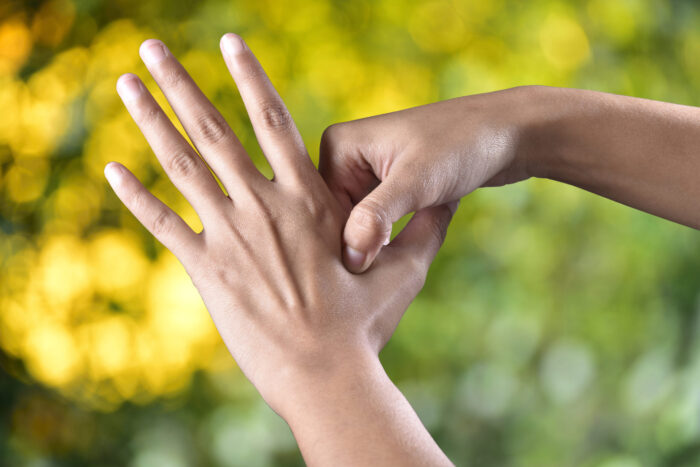
Set the tone for a healthy new year with Acupressure
Acupressure is the application of gentle pressure to acupuncture points. It is a great way to give yourself an at home treatment that can be done simply and easily using just your fingers. In this blog, I’ll provide instructions for how to perform acupressure and share information on some points you can try at home. I’m including a variety of points that can help with issues like anxiety, congestion, constipation, cough, depression, grief, headaches, inflammation, insomnia, irritability, menopausal symptoms, menstrual pain, nausea, PMS, stress, and tension.
How to perform acupressure
- Use your index and / or middle fingers to apply a downward pressure with small circular motions (about a quarter of an inch) to the acupuncture point.
- Feel for painful areas or areas of tightness or emptiness.
- Massage for at least ten seconds, and up to a few minutes.
- Stimulate points at least two times per day, for example, once in the morning and once at night.
Try acupressure with these acupuncture points
Yintang
Yintang means “Hall of Impression”. It is located between the eyebrows and is in the area referred to as the “third eye” in many cultures. This is a wonderfully calming point.
- Location: Place a finger at the glabella, which is the skin above the nose between the eyebrows.
- Uses: nasal congestion, runny nose, headaches in the forehead region, anxiety, insomnia.
Lung 1
The Chinese name of this point is Zhongfu. It means “Middle Palace”. It is the first point on the Lung channel. People often find this point to be tender when they have grief that has not been released.
- Location: Slide the finger below the clavicle from the sternum towards the shoulder, stopping at the shoulder . Then move your finger down and slightly out about a finger width to find Lung 1.
- Uses: cough, wheezing, asthma, shoulder/chest tension, grief.
Ren Mai 17
The Chinese name of his point is Shanzhong. It means “Chest Center”. This point is the 17th point on the Ren Mai channel. This channel runs up the front of the body and is also known as the Conception Vessel channel.
- Location: Place the finger(s) on the center of the chest at the level of the fourth intercostal space which is located at the natural line of the nipples.
- Uses: stress and anxiety in the chest region, relaxes the chest and releases the diaphragm.
Pericardium 6
The Chinese name of this point is Neiguan. It means “Inner Pass”. It is the 6th point on the Pericardium channel. Motion sickness bands target this point, and it can be great for relieving nausea. It is also a primary point for anxiety.
- Location: On the inside of the wrist, place the finger two finger-breadths away from the wrist crease in between the two tendons (palmaris longus and flexor carpi radialis).
- Uses: anxiety, motion sickness, nausea, insomnia, carpal tunnel syndrome.
Large Intestine 4
The Chinese name of this point is Hegu. It means “Joining Valley”. Hegu is the fourth point on the Large Intestine channel. It is a principle point used with any issues of the head and face, including headaches.
DO NOT USE THIS POINT IF YOU ARE PREGNANT. This point has a strong downward action and is contra-indicated in pregnancy.
- Location: Slide the finger from the joint of the index finger towards the wrist stopping in the depression where the thumb and index finger bones meet.
- Uses: headaches in the front of the head, toothaches, pain, cold symptoms, constipation.
Liver 3
The Chinese name of this point is Taichong. It means “Great Rushing”. It is the third point on the Liver channel. This point, combined with Large Intestine 4, is referred to as part of the “four gates” which help circulate energy through the body.
- Location: Place the finger on top the of the foot in the depression between the big toe and second toe and slide the finger toward the ankle into the most tender part of the depression between the two bones.
- Uses: PMS, menstrual pain, anger, irritability, stress, headaches, anxiety.
Kidney 1
The Chinese name of this point is Yongquan. It is the first point on the Kidney channel. It means “Gushing Spring”. This is an excellent point for grounding energy.
- Location: Place the finger on the bottom of the foot in the depression near the upper middle portion of the foot.
- Uses: insomnia, palpitations, anxiety, anger, poor memory, hot flashes, night sweats.
Ear Shen Men
Ear Shen Men means Ear “Spirit Gate”. It is the most widely used point on the ear.
- Location: At the apex of the triangular fossa in the upper third of the external ear. This is the triangular shaped depression at the top of the inside of the ear.
- Uses: Pain, stress, anxiety, depression, inflammation, addiction.
Questions?
If you have any questions or trouble locating any of the points, please reach out and email me through our website or call or text 910-622-4269. I’d love to hear from you!
About the Author
Ericca Burke is the owner of HAVEN Acupuncture & Chinese Medicine where she provides acupuncture and Chinese medicine treatments in Wilmington, NC. Click this link to read more about Ericca.
About HAVEN Acupuncture & Chinese Medicine in Wilmington, NC
HAVEN Acupuncture & Chinese Medicine is an acupuncture and Chinese medicine practice located in Wilmington, NC just minutes from beautiful Wrightsville Beach. Click this link for contact information and directions. Click this link for a listing and description of services offered.